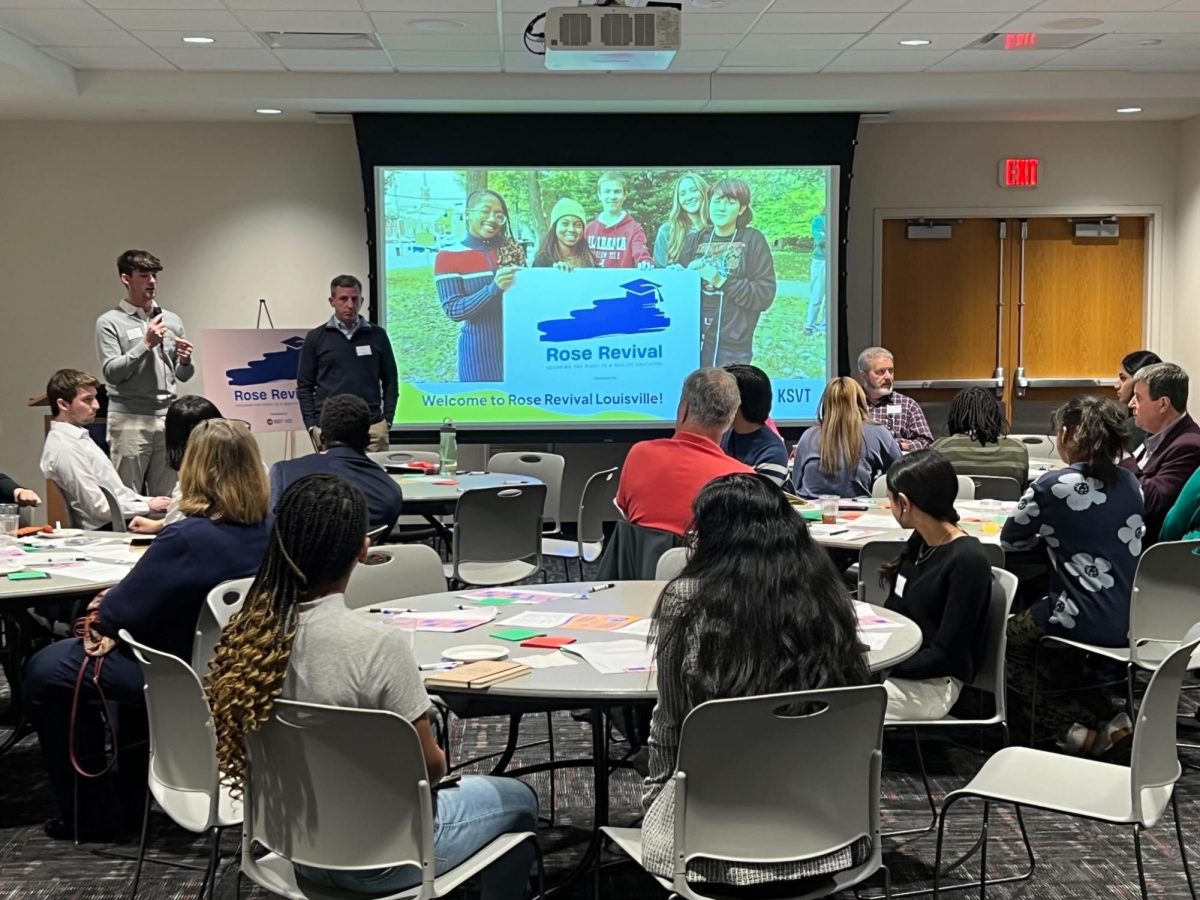This editorial was submitted by Maanya Sunkara (10, MST).
In Louisville, the weeks leading up to the first Saturday in May are nothing short of chaos. From Thunder over Louisville to the Pegasus Parade, the city makes enormous efforts to generate excitement for the Kentucky Derby, a horse race otherwise known as the Run for the Roses. Year after year, Louisville celebrates its historic traditions, honoring the city’s rich sense of culture and community. This sense of community and connection drives Louisvillians to work hard throughout the year, especially during the Derby season. Similarly, the Kentucky Student Voice Team (KSVT), an organization focused on young people co-creating equitable and democratic schools, is gearing up for its own Run for Rose.
Although the level of determination coming from the city of Louisville and KSVT is similar, our Run for the Roses has a different goal: We’re revisiting our state’s landmark Supreme Court decision, Rose V. Council for Better Education. As a JCPS student and member of KSVT, this revived effort for quality education is incredibly important to me.
First established in 1989, the Rose v. Council for Better Education decision standardized adequate education for all Kentucky students by declaring the state’s school systems unconstitutional. As a result, the Kentucky Education Reform Act (KERA) was implemented.
It wasn’t long before challenges arose. In my experience, our teacher could not come to school for two weeks straight while I was in eighth grade. With no substitute teacher, my advanced class and a less advanced class conjoined. One classroom of over 40 kids, a single teacher, and varying paces of learning is a catastrophe waiting to happen, but all other options were depleted. A lack of funding and inadequate resource allocation were pivotal ingredients in the recipe for disaster.
After experiences like mine became more frequent, including transportation issues, a decline in student achievement and an overall lack of civic engagement, the need to renew Rose became increasingly evident. In response to these adverse effects, KSVT made it their mission to reimagine the classroom, uphold student rights and revive the seven capacities that should have promised students an adequate education.
On November 18th, 2023, the race for Rose finally visited Louisville. KSVT held a public forum at the Mitch McConnell Center, led by Will Powers, an adult ally of KSVT and former Kentucky student. Alongside Powers, Professor Michael Gregory, director of the Youth Advocacy and Policy Lab at Harvard University aided in introducing the campaign, specifically the capacity that deals with civic engagement. KSVT members and teachers from across the state came to learn about the seven capacities of the Rose Revival Campaign.
Going into the event, I had limited knowledge on Rose. I knew it was a Kentucky Supreme Court decision, but I only vaguely knew the extent of its educational reach. As the discussion continued, however, my vision of what a classroom should look like drastically changed. I reflected on educational experiences I originally thought were adequate until I talked about them with educators and administrators.
Conversations centering around the question of adequacy in schools varied significantly depending on attendee experiences. In the focus group I facilitated, teachers talked about the burden placed on them to meet such expectations. Without sufficient resources, many teachers are subject to greater responsibilities than in their job scope. Creating lesson plans in subjects they aren’t experienced in and being accountable for more than 30 students were only some of the issues teachers communicated.
Students at the forum, myself included, spoke about their experiences. Attending Manual in JCPS, I am offered many opportunities to further my success. Although academic opportunities in my school have been in line with Rose, the competitive and oftentimes toxic environment underscores the poor mental support available for students. Many of my peers shared how the emphasis on being above average in school has hindered their motivation to do well. The competitive nature enforced by administrators in the school to be the best school in the state burns students out and affects their mental health. To counter such dangerous effects, access to sufficient mental services in school is necessary, yet most of the time they are brushed over as unimportant.
The forum showed me not only the massive divide between school levels of adequacy, but also the community that drives change around Kentucky schools. The education I received and continue to receive at duPont Manual High School has allowed me to learn, grow, and change. My education, however, is only one of thousands. In the current school systems, both my positive and negative experiences are a privilege, which shouldn’t be the case.
A thorough understanding of governmental processes and civic engagement in our country should not be a privilege. Learning and appreciating culture and history should not be a privilege. Being prepared for a career or education after high school should not be a privilege. Transforming these so-called privileges into promises is key to the growth of the education system in Kentucky. As this campaign continues, I hope to see the promise of accomplishing equity, adequacy and a quality education for Kentucky students become a reality beyond the twin spires of Louisville.







Krish Shah • Feb 21, 2024 at 11:12 pm
Awesome story! Loved the insights provided about competition culture correlating to the effects of mental health ???